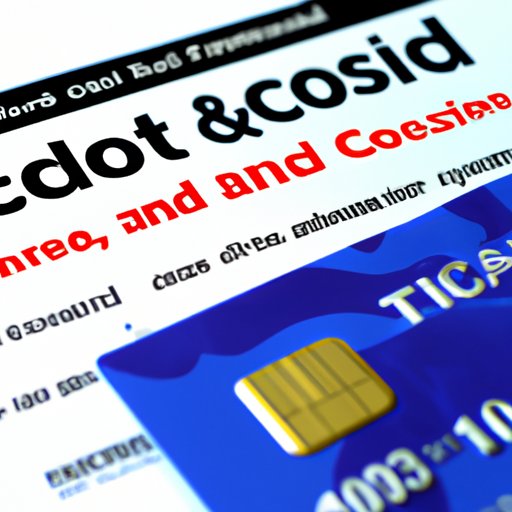
Introduction
With the convenience offered by credit cards, many people are wondering if it’s possible to take cash out of their credit cards. The answer is yes, but there are certain things you need to know before making the decision to do so. In this article, we will discuss the ten things you should know before taking cash out of your credit card, things to consider before making the decision, the pros and cons of taking cash out of a credit card, and how it can affect your credit score. We’ll also look at alternative options and fees and interest rates associated with taking cash out of your credit card. Finally, we’ll provide tips on how to properly pay off the balance after doing so.
10 Things You Need to Know Before Taking Cash Out of Your Credit Card
Before taking cash out of a credit card, it’s important to keep in mind these ten things:
- You will be charged a cash advance fee, typically ranging from 2% to 5% of the amount withdrawn.
- The interest rate for cash advances is higher than the rate for purchases, and interest starts accruing immediately.
- Your credit utilization ratio will increase, which can harm your credit score.
- You may have a limit on the amount you can withdraw, typically a percentage of your credit limit.
- Some ATMs may charge additional fees.
- You may have to use a special PIN to withdraw cash.
- You will only be able to withdraw up to the amount available in your cash advance limit, which is usually a smaller amount than your overall credit limit.
- Your minimum payment due may increase due to the higher interest rates.
- Taking cash out of your credit card should be reserved for emergencies only.
- You should have a plan to pay back the cash advance as soon as possible to minimize the impact on your credit score and interest fees charged.
What You Should Consider Before Deciding to Take Cash Out of Your Credit Card
Before taking cash out of your credit card, you should consider the following:
- Do you really need the cash or are there alternative options?
- Can you pay it back soon enough to avoid accruing too much interest?
- Can you afford the cash advance fee?
- Will your credit score be impacted?
- Can you commit to paying more than the minimum payment to pay off the cash advance balance?
Considering these things can help you decide if taking cash out of your credit card is the best option for you.
The Pros and Cons of Taking Cash Out of Your Credit Card
As with any financial decision, there are pros and cons to taking cash out of your credit card.
Pros
- Convenience: Taking cash out of your credit card can be a convenient way to get cash when you need it.
- Quick cash: Cash advances can be obtained almost instantly, making them a good option when you need immediate access to cash.
- Easy qualification: As long as you have available credit, it’s easy to qualify for a cash advance on your credit card.
Cons
- Higher fees: Cash advances come with higher fees and interest rates, which can add up quickly.
- Increased chance of debt: Taking cash out of your credit card can increase the chances of getting into debt, especially if you’re not able to pay it off in a timely manner.
- Negative impact on credit score: Cash advances can impact your credit score negatively, especially if you use up a large percentage of your credit limit or don’t pay off the balance promptly.
- Not a long-term solution: Cash advances should only be used for emergencies and not as a long-term solution to financial problems.
It’s important to weigh the pros and cons before making the decision to take cash out of your credit card.

How Taking Cash Out of Your Credit Card can Affect Your Credit Score
Taking cash out of your credit card can negatively impact your credit score in several ways:
- Credit utilization ratio: Withdrawing cash can increase your credit utilization ratio, which can hurt your credit score.
- Payment history: Late payments or missing payments on your cash advance balance can negatively affect your payment history.
- Hard inquiry: If you need to apply for a credit limit increase to access the cash advances, a hard inquiry will be placed on your credit report, which can lower your credit score.
To minimize the negative impact on your credit score, you should pay off the cash advance balance as soon as possible and avoid taking out more than you need.
5 Alternatives to Taking Cash Out of Your Credit Card
If you’re in a financial bind, there are alternatives to taking cash out of your credit card:
1. Personal loan
A personal loan typically has lower interest rates than cash advances, making it a better option in the long run. However, qualifying for a personal loan can take longer than a cash advance.
2. Friends and family
If you need a small amount of cash, consider asking friends or family if they can lend it to you. Just be sure to pay them back promptly and keep your relationship intact.
3. Selling unwanted items
If you have items you no longer need or want, selling them online or at a garage sale can get you the cash you need without hurting your credit score.
4. Overdraft protection
If you have a checking account with overdraft protection, you can withdraw up to a certain amount without being charged a fee.
5. Side gig
If you have skills that can be used to generate extra income, consider taking on a side gig or freelance work to make some extra cash.
The Different Fees and Interest Rates Associated with Taking Cash Out of Your Credit Card
When taking cash out of your credit card, be aware of the following fees and interest rates:
- Cash advance fee: Typically ranges from 2% to 5% of the amount withdrawn.
- ATM fee: Some ATMs may charge additional fees.
- Higher interest rate: The interest rate for cash advances is higher than the rate for purchases, and interest starts accruing immediately.
These fees and interest rates can add up quickly, so it’s important to consider them before taking cash out of your credit card.
How to Properly Pay Off the Balance After Taking Cash Out of Your Credit Card
If you’ve taken cash out of your credit card, it’s important to pay off the balance as soon as possible to avoid accruing too much interest and negatively impacting your credit score. To do so:
- Pay more than the minimum payment: Paying only the minimum payment will prolong the time it takes to pay off the balance and increase the amount of interest paid.
- Make payments on time: Late or missed payments can hurt your credit score and result in additional fees.
- Consider a balance transfer: If you have a high balance on your cash advance, a balance transfer to a credit card with a lower interest rate can help you save money.
Conclusion
Taking cash out of your credit card can seem like a convenient option when you’re in a financial bind, but it’s important to consider the fees, interest rates, and impact on your credit score before doing so. By following the tips in this article, you can make a well-informed decision and avoid getting into further financial trouble.





